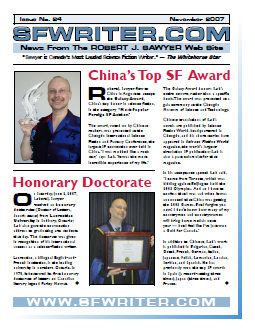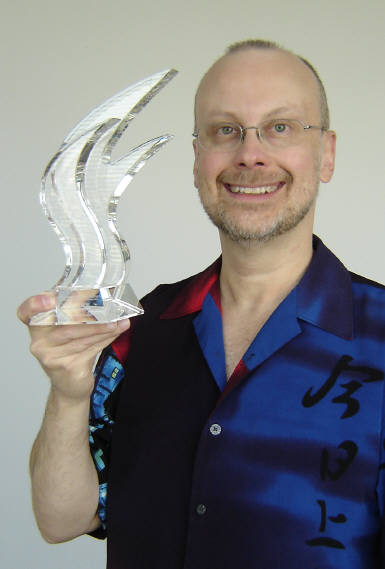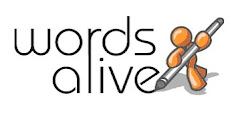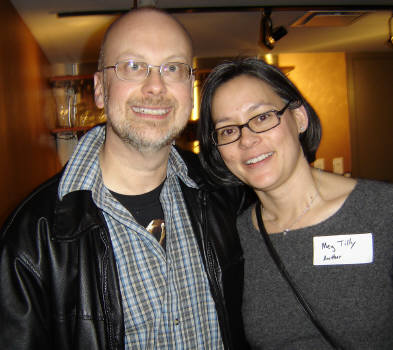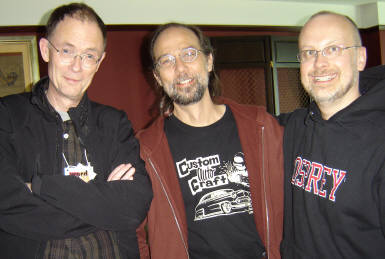
To my astonishment and delight, I won my tenth Aurora Award on Sunday (the Auroras are the Canadian Science Fiction and Fantasy Awards, established in 1980).
Michael Walsh and Clint Budd, who organized the ceremony, did an amazing job, with a wonderful banquet (something done too infrequently for the Auroras) followed by a witty Aurora keynote address by Matthew Hughes -- the first time the Auroras have included a keynote speaker. As it happened, I was master of ceremonies for this year's Aurora Awards -- my seventh time having the honour to fulfill that particular role.
Although many people praised my performance as MC, to be honest I thought I managed about a 7 out of 10. I was tired: the ceremony was held Sunday afternoon, and not only did I have con fatigue by that point, but I'd been on the road for 16 days leading up to the ceremony. Still, people laughed in all the right places, and I was pleased.
The biggest bit of drama came when the Best Short-Form Work in English award was announced. The wonderful artist Martin Springett came up to the podium to present the award, and after announcing the nominees, he opened the envelope and read out the supposed winner: John Mierau.
As MC, I was standing off to the side and could clearly see the card Martin had taken out of the envelope; he'd read it correctly. I was applauding John's win when Michael Walsh stepped out from behind the table that held the Aurora trophies, and said, "There's been a mistake."
VCon 32, this year's Canadian National Science Fiction Convention ("CanVention"), had allowed on-site voting for the Auroras (in addition to the traditional mail-in voting), and so voting had closed just 18 hours before the awards banquet began.
Michael had been involved in counting the ballots Saturday night, and had handed a master copy of the ballot to his wife, Susan Walsh, on which he'd checked off the winners in each category. Susan then wrote out the cards naming the winners to go in the envelopes -- a job done late at night, when everyone was tired. Near as I can figure it out, Susan looked at the sheet, saw that the winner was from the anthology
Slipstreams, and so wrote down the name of one of the authors who had been in that book, the aforementioned John Mierau.
But Michael had actually marked the
other story from
Slipstreams, a little number called "Biding Time," by one Robert J. Sawyer. After suitable apologies for the error -- stretching the suspense in the process -- he announced that I, in fact, had won the award.
Thank God John was not in attendance (I remember being at a Worldcon when Richard and Nikki Lynch were announced as winners of the best-fanzine Hugo only to have Richard (I think) recognize that an error had been made when he looked at the name on the trophy). John's a very fine writer, and I'm sure he will be taking home an Aurora down the road.
It was an odd sensation. I hadn't expected to win (my money was on James Alan Gardner's charming "All the Cool Monsters at Once"), and I'd prepared a schtick as MC, which I delivered anyway, in case my writing student Hayden Trenholm had beaten me, doing my best James Earl Jones as Hayden and intoning, "Then I was the learner; now
I am the master"). I went in the space of about a minute from "well, I didn't expect to win anyway," to "good for John!" to "oh, crap, something's gone wrong with the ceremony I'm MCing," to "say
what?"
Now, as it happened, prior to this win, I had nine Aurora Awards to my credit: four for best English novel, four for best English short story, and one for best English "Other." But that didn't make me the all-time Aurora champ; rather, it made me
tied with Francophone writer Elisabeth Vonarburg; we each had nine a piece. But when I won for "Biding Time," I pulled ahead, becoming the undisputed record holder ...
... a title that lasted for about three minutes, because the next Aurora to be presented was "Best Long Form Work in French" -- and who should win
that but
mon cher amie Elisabeth. So, we're tied again. :)
As usual, the wonderful Frank Johnston made the Aurora trophies, but I have to say that this year's were particularly lovely; the maple wood bases were are just gorgeous.
To my delight and astonishment, somehow over Saturday night, all ten Aurora trophies had their plaques engraved with the winner's names (and, yes, the English short-form one
does have my name on it). I'd flown to Vancouver with only carry-on luggage, but had to check my bag when I left on Monday, since the Aurora has sharp metal parts that wouldn't be allowed in the aircraft cabin.
"Biding Time" is a sequel to my Hugo- and Nebula-Award nominated novella "Identity Theft." It also is, incidentally, the last short story I plan to write, at least for the foreseeable future. Although I enjoy short fiction, I really feel a need to concentrate on my novels now.
"Biding Time" first appeared in the DAW anthology
Slipstreams edited by John Helfers and Martin H. Greenberg; it's also been reprinted in
The Penguin Book of Crime Fiction edited by Peter Robinson, and will be the closing story in my second short-story collection, "Identity Theft and Other Stories," coming from Red Deer Press in February 2008. I'm delighted to be going out with a winner.
Historical note: The core plot of "Biding Time," which is a hard-boiled detective story set on Mars, was originally part of my 16th novel
Mindscan; the motivation used for the murder was the same one I'd originally written for Tyler Bessarian suing his mother Karen in that novel; I removed it at the request of my editor, David G. Hartwell, who found it too unsettling. But, as one reviewer said of "Biding Time," the story really does posit a genuinely new science-fictional motive for murder, and I'm delighted that I found a way to use it, and that, like Karen in
Mindscan, it has now been ensured a small degree of immortality.
The full text of "Biding Time" has been up on my web site during the nominating and voting periods for the Auroras, and I'll leave it up a little while longer for those who are curious: it's
here.
(Oh, and for those who might now be saying Rob Sawyer always wins the Aurora, I'll gently point out that I hold the record -- yes, beating even Elisabeth! -- for the most Aurora
losses. I've been nominated 35 times for the Aurora to date, meaning I've got 10 wins and 25 losses, or a 1 in 3.5 success ratio; that's only slightly better than what random chance would dictate: there are usually five nominees in each Aurora category, so a purely random choice would have had me winning 1 in 5 times, for a total of seven, instead of ten, awards. I'm hardly a slam-dunk winner when it comes to the Auroras, and I truly am thrilled and grateful for each one.)
My Aurora Award wins:
Best Long-Form Work in English:
Golden Fleece [1990],
The Terminal Experiment [1995],
Starplex [1996], and
Flashforward [1999]).
Best Short-Form Work in English:
"Just Like Old Times" [1993],
"Peking Man" [1996],
"Stream of Consciousness" [1999],
"Ineluctable" [2002]), and
"Biding Time" [2006].
Best Work in English (Other):
Relativity, a collection of essays and stories, [2004]
Pictured above: Robert J. Sawyer with the one that almost got away ...The Robert J. Sawyer Web Site
Labels: Auroras, Short Fiction
